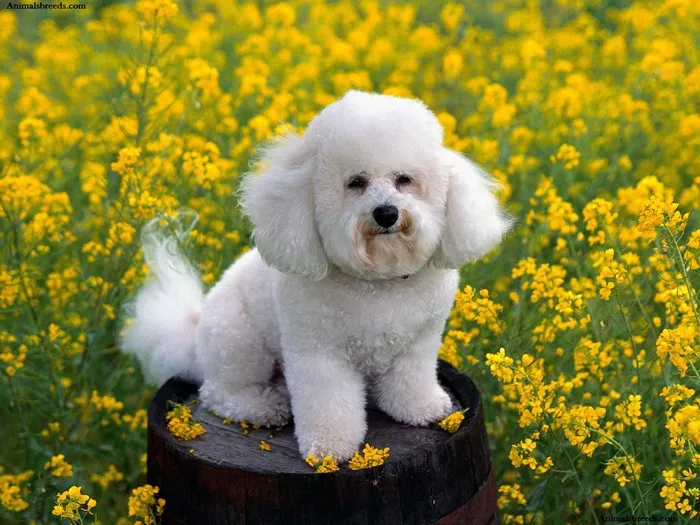Bichon Frise dogs are a beloved breed known for their playful and affectionate personalities. While many people are familiar with the standard Bichon Frise, there are actually four different types of Bichon Frise dogs. In this article, we will explore the characteristics and traits of the four types of Bichon Frise dogs.
Bichon Frise
The standard Bichon Frise is the most well-known type of this breed. These dogs are small, fluffy, and have a distinctive curly coat. They are known for their playful and affectionate personalities and make great family pets. Bichon Frise dogs are also intelligent and easy to train.
Bichon Bolognese
The Bichon Bolognese is a smaller variety of the Bichon Frise breed. They are similar in appearance to the standard Bichon Frise, but are smaller and have a shorter coat. Bichon Bolognese dogs are known for their sweet and affectionate personalities and make great lap dogs. They are also intelligent and easy to train.
Bichon Havanese
The Bichon Havanese is a variety of the Bichon Frise breed that originated in Cuba. These dogs are known for their long, silky coats and their playful and affectionate personalities. Bichon Havanese dogs are also intelligent and easy to train, and make great family pets.
Bichon Tenerife
The Bichon Tenerife is a variety of the Bichon Frise breed that originated in the Canary Islands. These dogs are similar in appearance to the standard Bichon Frise, but have a slightly longer coat. Bichon Tenerife dogs are known for their playful and affectionate personalities, and make great family pets. They are also intelligent and easy to train.
Characteristics of Bichon Frise Dogs
While each type of Bichon Frise has its own unique characteristics and traits, there are some common characteristics that are shared by all Bichon Frise dogs. These include:
Playful and affectionate personalities
Intelligence and trainability
Small size
Fluffy coats
Hypoallergenic qualities
Long lifespans
Caring for Bichon Frise Dogs
Caring for Bichon Frise dogs involves regular grooming to maintain their fluffy coats, as well as providing them with a healthy and balanced diet. Bichon Frise dogs also require regular exercise and socialization to keep them happy and healthy. It is important to provide them with plenty of love and attention, as they thrive on human interaction.
Conclusion
Bichon Frise dogs are a beloved breed known for their playful and affectionate personalities. While there are four different types of Bichon Frise dogs, each type shares common characteristics such as intelligence, trainability, and a small size. Caring for Bichon Frise dogs involves regular grooming, a healthy diet, regular exercise, and socialization. By providing them with the love and attention they need, you can ensure that your Bichon Frise is happy and healthy for years to come.
FAOs
1. How can you tell if a Bichon Frise is purebred?
To determine if a Bichon Frise is purebred, look for breed-specific physical characteristics such as a rounded skull, dark, round eyes, a short muzzle, a curly tail carried over the back, and a dense, curly coat that is white or white with patches of cream, apricot, or gray.
2. What two breeds make a Bichon?
The Bichon Frise is believed to be a descendant of two Mediterranean breeds: the Barbet and the Water Spaniel. Over time, these breeds were crossed to develop the Bichon Frise we know today.
3. Is it better to get a male or female Bichon Frise?
Whether to choose a male or female Bichon Frise is primarily a matter of personal preference and individual temperament. Both genders can make excellent pets, and factors such as personality, training, and compatibility with existing pets should be considered when making a decision.
4. Why are Bichons so clingy?
Bichons are known for their affectionate and sociable nature, often forming strong bonds with their owners. Their clinginess may stem from their desire for companionship and attention, as they thrive on human interaction and can suffer from separation anxiety if left alone for long periods. Regular socialization, training, and providing mental stimulation can help alleviate clinginess and promote a well-balanced Bichon Frise.


